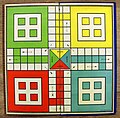Ludo
Ludo , also called Ludi , is a very simple, pachisi- like board game for two to four players. "Ludo" comes from Latin and translates as "I play".
history
The game was patented in England in 1896 under patent number 14636 and emerged from the game Patchesi . Patchesi was manufactured by the John Jaques & Son company, founded in 1795, as the first English pachisi derivative and sold until the 1920s. Ludo is a greatly simplified and child-friendly version of the Patchesi . Likewise, the paths of the game have been worked out more clearly in color and with arrows. A big difference to the Patchesi is that in Ludo the pieces are drawn clockwise. This makes Ludo the first Pachisi derivative that changed the original direction of movement.
It is probably the direct predecessor of the game " Mensch ärgere Dich nicht ".
Rules of the game
The original rules of the game are very simple: You roll a single die . A six may be pulled out of the corners (yards). A six allows another roll. There can only be one token on a space. If there is an opposing figure on a target square, it is captured and must go back to its corner. There are no safe fields other than the field in front of your yard and the "stairs". If a piece comes onto a field that is occupied by one of its own, these are combined into one piece, similar to the Yut game. They then move together, but are both captured by an opposing piece. There are no blockages in fields like in most other Pachisi derivatives. It must be drawn to the center with an accurate throw.
There are many variations of the rules of the game. A common variant is that the blockages are allowed again. Another variant is just as common that the possibility of combining two game pieces does not exist. In earlier versions, the pieces were still in the shape of the pieces in checkers or simple rolling paper. More recent editions have included Pöppel (male), as they are common in people do not get angry or hurry with a while . With these no "towers" can be built and so this rule of the game is not applicable.
Individual evidence
- ↑ Ludo / Ludi at www.classicgameboardstore.com, accessed on June 28, 2014.
- ↑ Ludo . Definition. 20th September 2015.
- ^ Austrian Games . Bonus Finder. December 13, 2018.
- ↑ Tradgames treatise on Pachisi & Ludo , accessed on 16 November 2007
- ↑ canton de vaud , département de la formation et de la jeunesse (dfj), des jeux et des hommes ( page no longer available , search in web archives ) Info: The link was automatically marked as defective. Please check the link according to the instructions and then remove this notice.
- ↑ a b Erwin Glonnegger : The games book. Board and placement games from all over the world. Origin, rules and history. Maier et al., Ravensburg et al. 1988, ISBN 3-473-42601-6 .




